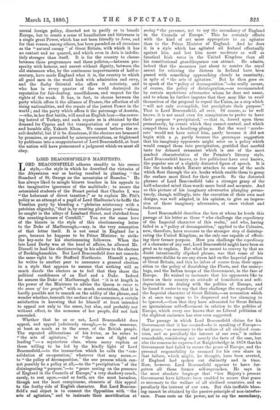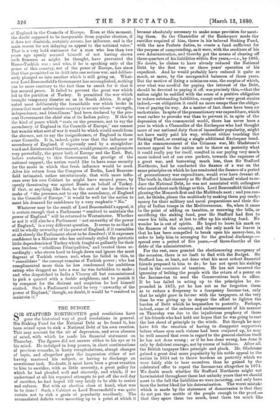LORD BEACONSFIELD'S MANIFESTO.
TAORD BEACONSFIELD adheres steadily to his rococo style,—the style in which he described the victories of the Abyssinian war as having resulted in planting " the Standard of St. George on the mountains of Rasselas." He has always liked to mingle bizarre touches in his appeals to the imaginative ignorance of the multitude ; to assure the astonished students of the Stuart period that Charles I. was " the holocaust of direct taxation ;" or to explain Mr. Pitt's policy as an attempt of a pupil of Lord Shelburne's to baffle the Venetian party by blending a " plebeian aristocracy with a patrician oligarchy," that is, by creating plebeian peers " whom he caught in the alleys of Lombard Street, and clutched from the counting-houses of Cornhill." You see the same love of the bizarre in the style of this electioneering letter to the Duke of Marlborough,—nay, in the very conception of that letter itself. It is not usual in England for a peer, because he happens to be Prime Minister, to strike the key-note for his electioneering followers. When the late Lord Derby was at the head of affairs, he allowed Mr. Disraeli to lead the electioneering in his address to the electors of Buckinghamshire. But Lord Beaconsfield does not concede the same right to Sir Stafford Northcote. Himself a peer, he writes to another peer to announce a general election in a style that appears to assume that nothing will so much dazzle the electors as to feel that they share the political confidences of an Earl and a Duke. Indeed he assures the Duke of Marlborough that " it is at length in the power of the Ministers to advise the Queen to recur to the sense of her people," with so much ostentation, that it is hardly possible not to remark on the oddity of the phrase, and wonder whether, beneath the surface of the assurance, a certain satisfaction in knowing that he himself at least intended to appeal not only to the sense, but also, and probably not without effect, to the nonsense of her people, did not lurk concealed.
Whether that be so or not, Lord Beaconsfield does appeal, and appeal judiciously enough,— to the nonsense, at least as much as to the sense, of the British people. The repeated alliterations of his letter, as he refers to " the arts of agitators," to " the men of light and leading "— a mysterious class, whom many explain as those willing to be led by the kindly light of Lord Beaconsfield,—to the transaction which he calls the " con- solidation of co-operation," whatever that may mean,— to " the policy of decomposition," the one process which can- not possibly be a policy at all,—to the " precipitation " of the disintegrating "purpose,"—to "peace resting on the presence of England in the Councils of Europe," a very shadowy couch, surely, to rest upon,—and so forth, are the most harmless, though not the least conspicuous, elements of this appeal to the frothy side of English character. But Lord Beacons- field's real object is to connect the Opposition with " the arts of agitators," and to insinuate their mortification at seeing " the presence, not to say the ascendancy of England in the Councils of Europe." This he certainly effects with the kind of art more appropriate to an agitator than to the Prime Minister of England. And he does it in a style which has agitated all Ireland effectually against him, and lost him more moderate as well as fanatical Irish votes in the United Kingdom than all his constitutional grandiloquence can attract. He admits, indeed that the measures just about to receive the royal assent for relieving the distress in Ireland have been passed with something approaching closely to unanimity, in spite of " the arts of agitators." But he then goes on to speak of the "policy of decomposition,"—he really means, of course, the policy of disintegration,—as recommended by certain mysterious adversaries whom he does not name, and to whom he further imputes that they may like to avail themselves of the proposal to repeal the Union, as a step which " will not only accomplish, but precipitate their purpose." That is Lord Beaconsfield, all over. Of course, as he well knows, it is not usual even for conspirators to prefer to have their purpose " precipitated," — that is, forced upon them prematurely, by events which they cannot control, and which compel them to a headlong plunge. But the word " accele- rate" would not have suited him, partly because it did not begin with a p, partly because the grotesque suggestion that his imaginary opponents might seize on a policy which would compel them into precipitation, gratified that morbid taste for debased ornament which is one of the most marked characteristics of the Premier's literary style. Lord Beaconsfield knows, as few politicians have ever known, the popular use of a slightly distorted figure of speech. It is like the hooks which Nature attaches to some of the seeds which float through the air, hooks which enable them to grasp the surface most fitted for their growth. So the distorted phrases of Lord Beaconsfield take a stronger grasp of the half-educated mind than words more lucid and accurate. And so this picture of his imaginary adversaries plunging prema- turely, though willingly, into the execution of their own mad designs, was well adapted, in his opinion, to give an impres- sion of those imaginary adversaries, at once violent and ludicrous.
Lord Beaconsfield describes the foes at whom he levels this passage of his letter as those " who challenge the expediency of the Imperial character of this realm," and who, having failed in a "policy of decomposition," applied to the Colonies, now, therefore, have recourse to the stronger step of disinteg- rating the United Kingdom, as the only one capable of effect- ing their former purpose. How you challenge the expediency of a character of any sort, Lord Beaconsfield might have been so good as to explain. But what he meant to convey by that no doubt intentionally slipshod phrase, was that some of his opponents dislike to see any stress laid on the Imperial position of Great Britain, and this he infers of course from their oppo- sition to the policy of flourishing the Fleets, and the money- bags, and the Indian troops of the Government, in the face of Europe. He wished to insinuate that his opponents like to fasten on their country an attitude of humiliation and self- depreciation in dealing with the politics of Europe, and he found it easier to say that they challenge the expediency of the Imperial character of Great Britain,—an accusation which is at once too vague to be disproved and too alarming to be ignored,—than that they have advocated for Great Britain an ignominious self-effacement in relation to the politics of Europe, which every one knows that no Liberal politician of the slightest eminence has ever even suggested.
The passage in which Lord Beaconsfield claims for his Government that it has secured—he is speaking of Europe—
that peace, " so necessary to the welfare of all civilised coun- tries, and so peculiarly the interest of our own," is rather remarkable, considering not merely the facts of the case, but also the remorse he expressed at Knightsbridge in 1878 that his Government had failed to secure the peace of Europe, and the personal responsibility he assumed for his own share in that failure, which might, he thought, have been averted, if England had spoken out distinctly and in time. Now, however, Lord Beaconsfield appears to have for- gotten all these former self-reproaches. He says in the most absolute language that "her Majesty's present Government have hitherto been enabled to secure that peace
so necessary to the welfare of all civilised countries, and so peculiarly the interest of our own. But this ineffable bless- ing cannot be obtained by the passive principle of non-interfer- ence. Peace rests on the power, not to say the ascendancy,
of England in the Councils of Europe. Even at this moment, the doubt supposed to be inseparable from popular election, if it does not diminish, certainly arrests, her influence, and is the main reason for not delaying an appeal to the national voice." That is a very bold statement for a man who less than two years ago openly accused himself of not having shown such firmness as might, he thought, have prevented the Russo-Turkish war ; and who, if he is speaking only of the peace of this country, not of the peace of Europe, has since that time permitted us to drift into one serious war, and deliber- ately plunged us into another which is still going on. What- ever Lord Beaconsfield's Government has accomplished, nothing can be more contrary to the fact than to assert for it that it has secured peace. It failed to prevent the great war which led to the partition of Turkey. It permitted the war which brought temporary disaster on us in South Africa. It origi- nated most deliberately the formidable war which broke in pieces that most unfortunate country to secure whose " strength, independence, and friendliness" had been declared by the pre- sent Government the chief aim of its Indian policy. If this be the kind of peace which "rests on the presence, not to say the ascendancy. of England in the Councils of Europe," one cannot but wonder what sort of war it would be which would result from the absence, not to say the insignificance, of England in those same Councils. It is, indeed, quite true that the influence or ascendancy of England, if vigorously used by a straightfor- ward and disinterested Government, would promote, and promote very powerfully, the peace both of Europe and the East. But, before restoring to this Government the prestige of the national support, the nation would like to have some security for the mode in which that fresh influence would be used. After his return from the Congress of Berlin, Lord Beacons- field intimated, rather ostentatiously, that with more influ- ence over his own Cabinet he might have secured peace, by openly threatening war against Russia on behalf of Turkey. If that, or anything like that, be the sort of use he desires to make of " the presence, not to say the ascendancy, of England in the Councils of Europe," it would be well for the nation to meet his demand for confidence by a very emphatic " No."
Whatever may be the result of Lord Beaconsfield's appeal, it is certain enough that a Parliament " resolved to maintain the power of England " will be returned to Westminster. Whether or not it will also be a Parliament "not unworthy of the power of England," is a very different question. It seems to us that it will be wholly unworthy of the power of England, if it resembles at all closely the Parliament about to be dissolved; if it expresses confidence in a Minister who has uniformly styled the patriotic little dependencies of Turkey which fought so gallantly for their own freedom " rebellious Principalities," and treated them ac- cordingly ; who strove hard to laugh down and ignore the most flagrant of Turkish crimes, and, when he failed in this, to " consolidate " the corrupt remains of Turkish power ; who has complimented more than he has condemned the ambitious satrap who dragged us into a war he was forbidden to make ; and who despatched to India a Viceroy all but commissioned to pick a quarrel with a feeble neighbour, and to punish it by conquest for the distrust and suspicion he had himself excited. Such a Parliament would be very " unworthy of the power of England," though, no doubt, it would be "resolved to maintain it."



































 Previous page
Previous page